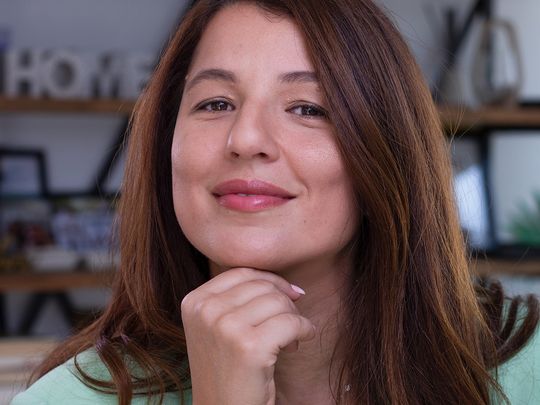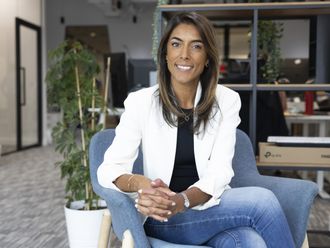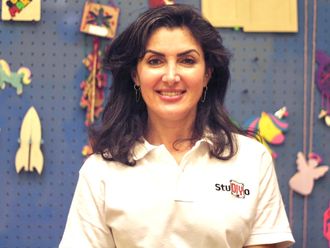
Dubai: Have you ever found yourself hesitant of venturing out into a new career path after working in an entirely different field for many years? Basma Chaieri did so too at first, but she did it anyway. The UAE-based Moroccan-French expat’s entrepreneurial plunge paid off in a couple of years too.
After being a travel executive for 15 years, at 40, Chaieri challenged herself to start a diamond jewellery business, Etika Jewels, with Dh400,000 of her savings in hand. The e-retailer not only broke even after 18 months of starting, it made its first seven-digit revenue last year. This is her success story.
"Creating and bringing something into existence from nothing has always excited me the most. My growing passion naturally led me to the world of lab diamonds and gemstone jewellery, learning about gemmology and diamonds, and ultimately launching an online platform for jewels," she said.
Long-time travel executive turns businesswoman
But for the newbie entrepreneur, as mentioned earlier, it was not always about getting diamond jewellery sold traditionally in physical shops to a digital space. When Chaieri came to Dubai 10 years ago, along with her husband, she was working for Booking.com, when she started a unit for the firm.
“I learnt the skill and thrill of building something from scratch throughout my career, particularly when I worked in travel, and established a business unit in the Middle East, Africa, and Turkey for Booking.com, while overseeing market strategy and sales for Expo 2020 Dubai,” Chaieri added.
It was not up until over two years ago, in late 2021, when she set up her own diamond jewel business, and in mid- 2022, when she launched an online retail platform. She revealed her customers grew ten times bigger than in the first year, with over 70 per cent of these being repeat customers.
Educating customers about lab grown diamonds
By branching her business out and making it an e-commerce portal, Chaieri has been hoping to make jewellery made from lab grown diamonds as an everyday accessory. “What is traditionally seen as demanding and exclusive, can then be more accessible to a wider audience," she said.
"Newer generations prioritise experiences over material possessions but still wish to remain fashionable and on-trend. Educating customers about the properties and value of lab diamond jewellery has been a relatively new concept.
"The process taught us how to adapt and navigate the complexities of e-commerce and the luxury goods market, anticipating changes and reshaping strategies accordingly. It’s all about standing out in a typically exclusive industry."
Tip #1: Always account for additional expenses
When funding the business with her savings, Chaieri deemed it “a calculated risk with unexpected twists”. “Business is a continuous adventure, so always account for additional expenses. Setting up a jewellery business in Dubai involved expenses common to any business setting,” she explained.
This includes costs like new business registration, obtaining visas, and registering the platform. Chaieri also listed out expenses like obtaining a specialised jewellery license, compliance costs, and securing physical space for the showroom, which she said, “demanded a significant investment”.
"Lastly, the initial stock procurement, the backbone of any retail business, especially in the fine jewellery sector, requires a substantial outlay to ensure we offer our customers a diverse and exquisite selection from the get-go," she added.
Encountering several hidden costs at the start
Chaieri revealed that she encountered several hidden costs. “This was mainly relating to opening bank accounts, complying with regulatory requirements, and managing rental or real estate expenses. We learned that an initial business plan cannot be set in stone; flexibility is crucial.
“When you think you've got everything under control, something pops up. For instance, the platform and customer journey I had envisioned for the website initially encountered several challenges and difficulties that adversely affected its performance,” she added.
"We had to rebuild the platform not once but twice. It was a significant surprise in our financial planning and highlighted the importance of accounting for potential setbacks and additional expenses."
Tip #2: Learn how to reassess and reprioritise tasks
To navigate the early stages of business development effectively, Chaieri advises to “reassess and reprioritise tasks”. “You can achieve all your goals, but only some at a time. Prioritise activities to launch your business is vital, while the less critical 'nice-to-haves' can be addressed later.
“This approach helps maintain focus and momentum." She further added how entrepreneurs often end up leveraging skills to mitigate some expenses. For her it meant, taking on “branding, content creation, managing social media platforms, and even designing jewellery pieces.
"I now reinvest profits into the business. Also, I follows the rule of value creation over income and prioritises building wealth rather than increasing revenue. This helps me shift focus from short-term profits, to earning long-term," she added.
Any money lessons learnt over the years?
Chaieri said she acquired three fundamental rules regarding money management over the years that have influenced her approach.
1. Firstly, she said she learnt to avoid borrowing money or relying on others for financial support. "This principle encouraged me to work hard and earn my way. I've maintained a clean slate of financial liabilities, allowing me to focus on wealth rather than debt repayment," said Chaieri.
2. Secondly, living within one's means for her is vital to saving more. "Spending less than what I earn not only prevents unnecessary debt, it enables savings for future needs or emergencies. It also allowed me to invest in experiences live life beyond the material,” she added.
3. Lastly, she sees real estate as the best investment. “It is a tangible asset that rises over time. I'm channelling my savings into real estate, seeing good returns on them. I own apartment properties in the UAE and Morocco. I focus on investments offering a rental yield of at least 5 per cent."
Final thoughts? "Now, in my 40s, my perspective has shifted. I value time more, especially time spent with family and loved ones. Instead of working longer hours, I focus on working smarter. I apply the '80/20 budgeting' rule. This approach allows them to manage my resources more effectively," she added.











